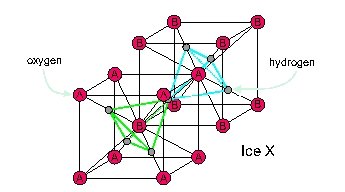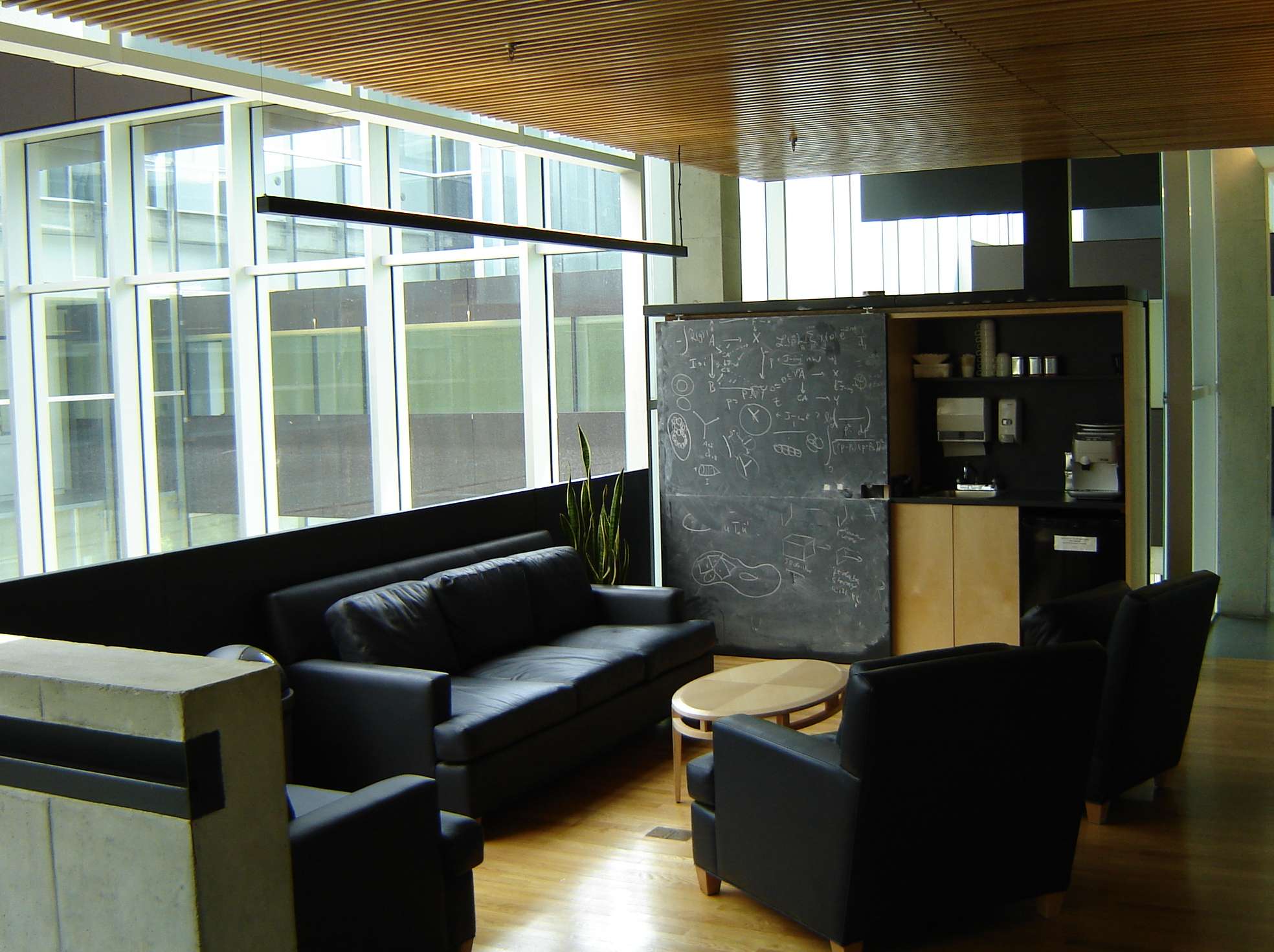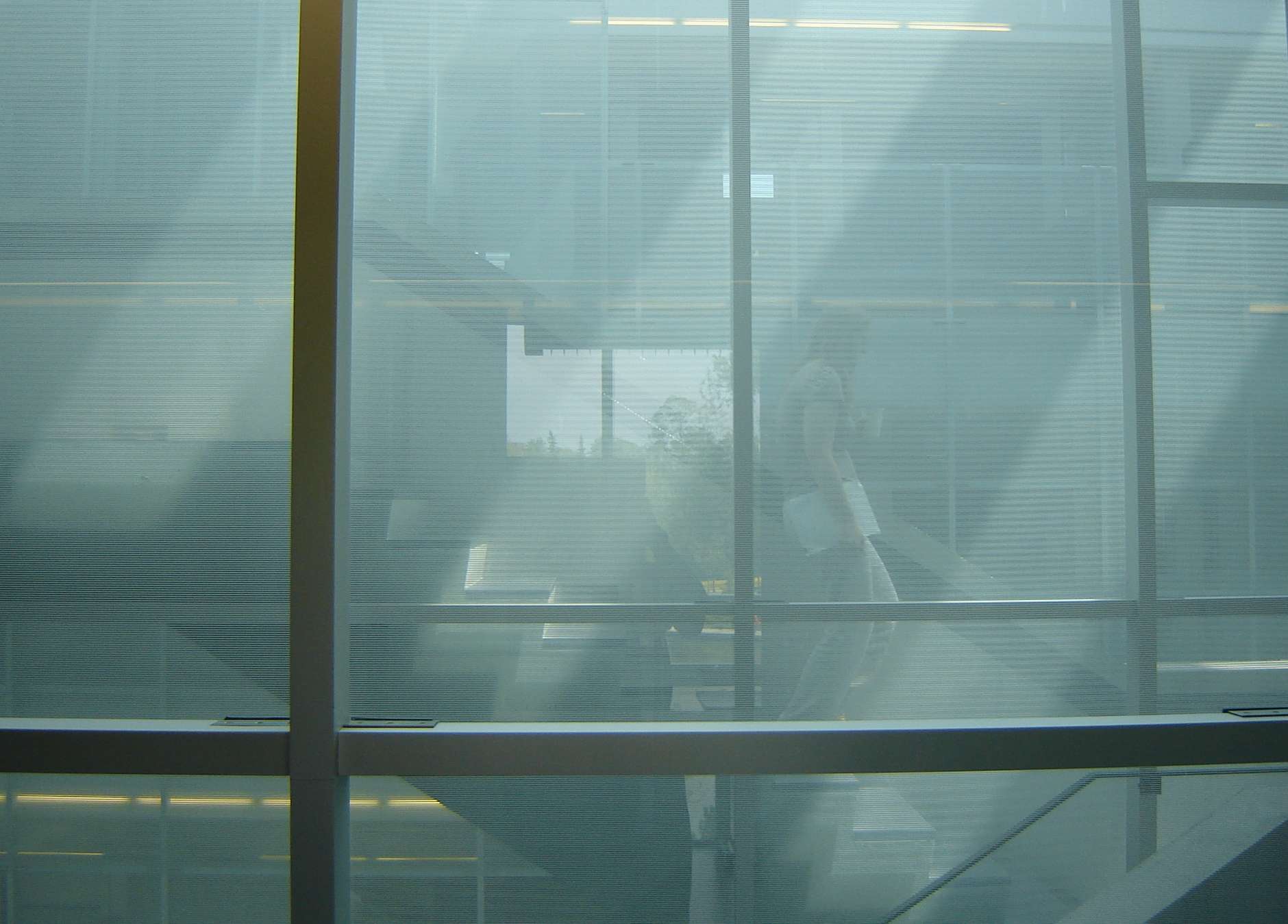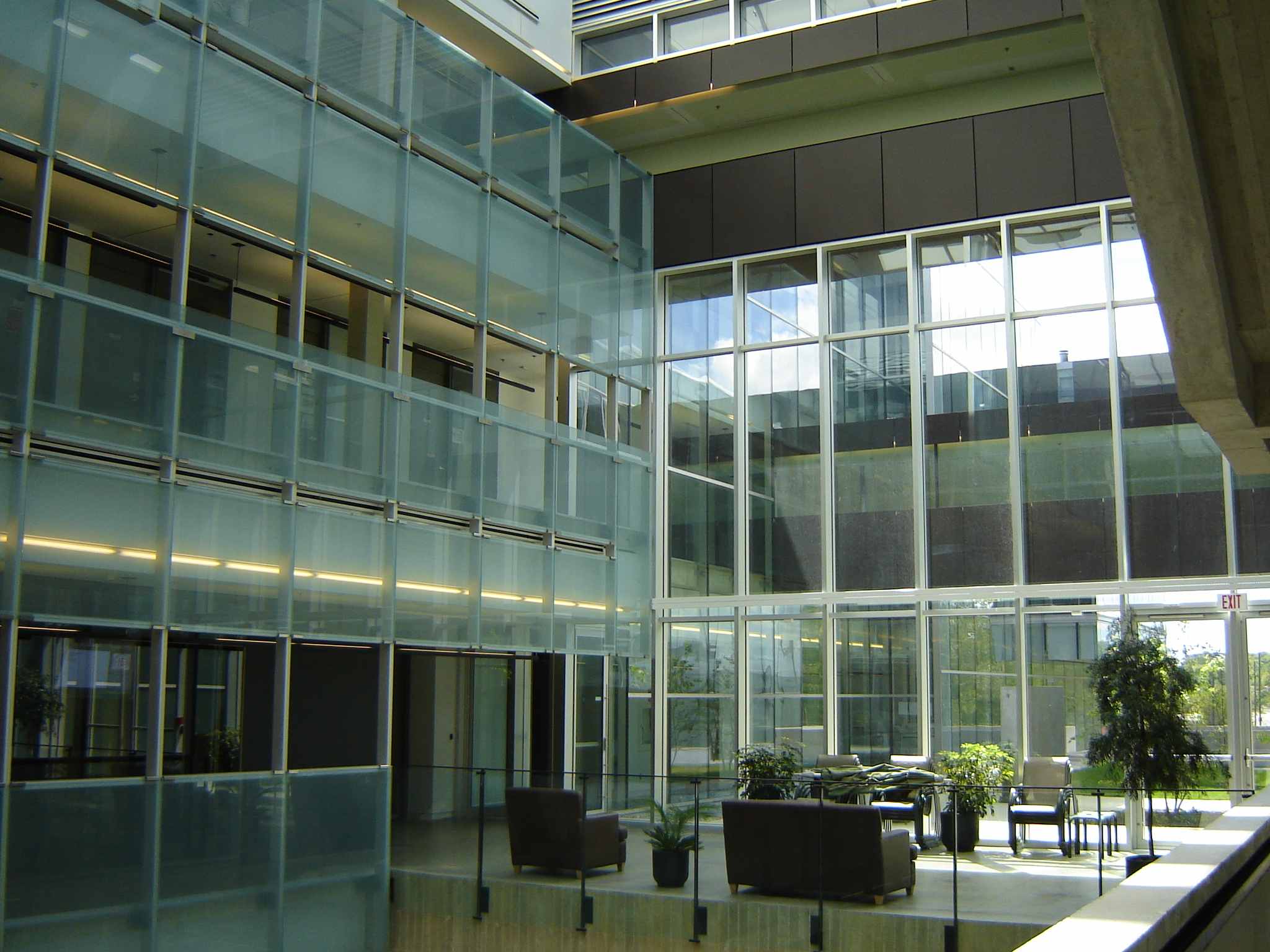
Damn! I just lost my diary entries from April 28th to now!
In fact I lost even more, but I was able to recover the entries up to April 28th using Google's cache. Something weird happened - the symbolic link connecting two files broke, and I wound up only keeping an old version of my diary webpage... I don't understand it. I'm usually pretty good about having lots of backups, but not this time.
Luckily I didn't lose anything too important. I spent last Saturday looking at 57th Street Books and the Oriental Institute exhibitions on Mesopotamia and Nubia. Then I wrote a fun, self-indulgent description of what I did - which is gone now.
One thing I did that day was buy a fascinating book on climate change:

Last night I stayed up 'til 2:30 celebrating Nick Gurski's successful thesis defense - Eugenia Cheng, Steve Lack, Tom Fiore and I went to Bar Louie next to the lake. My stay here in Chicago is almost over - on Monday I go to the Perimeter Institute. I'll actually miss Bar Louie - I'm not a bar kind of guy, but it's fun staying up late talking to friends, not something I normally do at home.
This morning I heard a disturbing Terry Gross interview with the author of this book:
Scarborough was a big supporter of Tom Delay - he claims Delay's problems are due not to his corruption, but to being a Christian. Now Vision America is going to try to help the Republicans win the 2006 congressional elections. And not just Republicans, either - I mean people like Mark Souder and Rick Santorum, who are actively promoting fundamentalism and pushing a know-nothing approach to science.
My theory about all this "culture war" stuff is that rapid economic, technological and social change in America has reached the point where a fundamentalist reaction is inevitable. The social fabric is frayed to the breaking point. Fundamentalism arises out of insecurity and fear of change and "the other". So now fundamentalists are gaining power, and our politics is all about gay marriage, immigrants, evolution, stem cell research and other scary things.
If the wave of reaction sweeping the red states takes over the US, the cultural creatives now clinging to the coasts may start leaving. The US would then become more provincial, more of a conservative cultural backwater, less of a leader in transformative technologies like computers and biotech. And, as competitors like China continue to grow, the US might eventually even lose its economic dominance. That might be a good thing for the world - a kind of homeostatic mechanism. But, I wouldn't want to stick around.
Later today: as the National Security Agency was caught doing "data mining" on tens of millions of US phone calls, President Bush claimed that "the privacy of all Americans is fiercely protected in all our activities." It's a good thing he never lies, or I might not believe this.
I think it's time for bed.
May 14, 2006
A friend wondered why I seemed to be saying fundamentalists were against illegal immigrants. I don't see much evidence of that, so I rewrote my May 11 entry to clarify things a bit.
I was getting a bit overheated. In fact, my internal fulminations were a lot more heated than what I wrote. I kept toning it down as I wrote it, because I'm tired of the aggressive rhetoric that seems to have infected American politics, and I don't want to contribute to that trend. But, I didn't entirely succeed.
So, let me try to be a bit clearer.
I think the negative aspects of current-day Christian fundamentalism in the US are mainly a symptom of fear, and the desire of some to crack down on illegal immigrants is another sign of this fear. The fear is of many interconnected things: the unravelling of traditional norms, the withering of civil society, the breaking of certain implicit contracts between employers and employees... all in all, the hastening transformation of our world into something that seems new, strange and threatening.
That "liberal" has become a dirty word in many quarters is partially due to the traditional liberal refusal to take some of these fears seriously. For example, when people say you can't legislate morality, they're neglecting the fact that all laws seek to do exactly that - except, I suppose, the blatantly cynical immoral pieces of legislation we occasionally see. When we make murder illegal, we are trying to impose certain norms on society, norms that are essentially "moral" or at least "ethical" in nature. So, we can and do legislate morality, and most of us don't complain... but when liberals see legislation that imposes moral standards they don't like, they tend to pull out the claim that you can't legislate morality, instead of bravely arguing the moreal issue in question. So, they wind up talking like morals don't matter. So, they should not be surprised when there's a harsh counter-reaction.
And, I hope it's clear I'm not just talking about the single phrase "you can't legislate morality". It's really a matter of a certain culture that's very articulate about the value of "freedom" and "rights", but not very articulate about "responsibility" and "duties". It's a kind of adolescent vision of morality....
So, there's a lot of talking at cross-purposes going on, and not enough clear thinking. This shows up quite vividly in arguments about movies and music. In the last few decades, certain businesses seem to have decided that a good way to make their entertainment products exciting is by breaking taboos against violence, lewdity, etcetera:
Of course, the whole ritual dispute is part of the marketing campaign, so we should probably not take it too seriously... but the strange thing is, I often agree with both sides! Yes, people should have the right to sell songs with nasty lyrics - but people also have the right to excoriate them for this, boycott businesses that sell these songs, and in general make this sort of thing socially unacceptable.
Okay, enough of this. I need some lunch.
May 17, 2006
On Monday May 15th I flew from Chicago to Toronto and then went to the Perimeter Institute in Waterloo. I made a complete fool of myself losing the name of the limo company that was supposed to pick me up, give me a packet of apartment keys and other useful stuff, and zip me directly to my apartment. I wound up taking another shuttle, paying it for myself, and lugging my suitcase upstairs to my office, where I waited for the limo driver to bring me that packet. It's actually good that this kind of thing happens now and then - one gets to thinking quite highly of oneself....
The Perimeter staff were friendly and utterly unperturbed, as if this happens every day - which it might, given the high concentration of absent-minded scientists at this place.
In case you've never heard of it, the Perimeter Institute is a place for research in quantum gravity, quantum computation and cosmology. It was set up by Mike Lazaridis, the guy whose company Research In Motion makes a handheld gadget called the BlackBerry, which serves as a cell phone but also lets you do email, text messaging, web browsing and all sorts of other things that increase your chances of getting mugged while walking around town. They say it's really addictive.
Lazaridis came from Waterloo, and when he made a lot of money he wanted to do something good for his home town, and for science, so he set up this physics institute. Lee Smolin played a key role in this... in 2003 he wrote:
Several years ago, I had the chance to move to Imperial College in London with the possibility of starting a research group. After I had been there a while, someone came to see me and said, "I represent some people who want to start an institute for theoretical physics. They want it to do fundamental work in things like quantum gravity, string theory, cosmology, and quantum mechanics and they have at least $100 million. What would you do? What fields would be included? How would you structure it? Who would be good to hire? Would you have a director? Would you pick somebody honored and wise and give him all the power to structure it, or would you just hire a bunch of young people out of graduate school and give it to them on a high-tech entrepreneurial model and let them run with it?" We talked about this, and he also talked to many people in these fields - Fotini Markopoulou-Kalamara, Carlo Rovelli, Chris Isham, Roger Penrose, and many others.For more, read this story:Very important in these discussions was the structure. My view was that it's wrong to give one person all the power, because this is science, and science functions best when people are independent and there's a community. The proposed institute - the Perimeter Institute for Theoretical Physics, in Waterloo, just outside of Toronto - was particularly meant to be an incubator for innovative ideas about fundamental questions, and new ideas tend either to come from young people or from people who keep themselves young by constantly moving into new areas. We scientists constantly criticize each other, and we work best in an open atmosphere where anybody can criticize anybody, honestly and directly. You also want a supportive atmosphere, where people are generous and sympathetic about difficulties and failures. We talked about all these things, and over time the prospect began to look more attractive than staying in London.

It's great here! First of all, it's so high-tech and space-age, I feel like a real scientist - you know, just like the ones you see in movies, where they have slick modern offices full of gee-whiz gadgets, instead of those old decrepit rooms stacked with papers that all my colleagues have. I even have an electronic keypass that I wave past my door to unlock it. Just being amid all this architecture and technology makes me want to do something cool! I sound like I'm being sarcastic and cynical, but it's true!
Second of all, there are some really good people around... and lots of talks. Today there was one on nanotech:
Buriak said the really cool journal for nanotech is Nano Letters, put out by the American Chemical Society. Unfortunately it's not free online.Here's one thing she pointed out which I was unaware of:
The "enchantment" aspect of technology is part of what makes it irresistible. It feels like magic to us - and so lofts us up out of our daily concerns, for a while at least. In his excellent novel of climate change called Fifty Degrees Below, Kim Stanley Robinson calls this experience the "technological sublime". Now I see there's a whole theory of this:
Some photos I took in the Perimeter Institute illustrate what I'm talking about:

and even better, this:

Robert Fripp is one of my favorite living musicians. He can lay down scalding guitar lines in 17/4 without even breaking a sweat, he can spin out the most gentle angelic ambience just as easily, and he has more music theory in his left pinky finger than you'll find in any textbook. So, it's nice to see that he's making the sounds for Vista, the next generation of Windows! And even nicer to actually watch a video of him doing it:
Something from his diary:
Paradise - Paradise Lost - Paradise Regained.Paradise is our natural condition. This is the good news.
Our condition is unnatural. This is the bad news.Love cannot bear that even one soul be denied its place in paradise. This is even better news. But, we cannot bear love. This is terrible news.
Paradise is always available. This is more good news.
But, we are not always available to paradise. This is more bad news.
I was battling a cold all week, and it seems to have triumphed yesteday. The day before I had a nice dinner at Fotini Markopoulou's place, with Anthony Leggett, Malcolm Perry, Simone Speziale, Daniel Terno, and Damian Pope. Malcolm Perry was the one who taught me general relativity when I was an undergrad at Princeton... so it was strange, but very nice, meeting him again and getting to know him better. I'd met Tony Leggett before when he gave a talk at UCR and I was on a panelist of commentators. Fotini is an old friend, and Simone and Daniel are very lively new ones. For dessert Fotini broiled some mangos in a sauce of coconut milk and lime juice. Wow! We also had dragonfruit, which always looks much more exciting than it tastes. We talked until midnight, then I stayed up until 2... I'm having trouble sleeping these days. And so, the cold got worse.
Did you know I'm running for president in 2024? I'm not - someone else with the same name is doing it as a joke. But, you can still buy a T-shirt.
Some other joker has set up a
myspace.com site under my name. Check out my disreputable
"friends". Think this will hurt my presidential
ambitions?
May 22, 2006
Still under the weather.. and the actual weather is cold, wet, and windy... so I've been staying in my apartment this weekend, including this Monday, which is Victoria Day here in Canada.
On Saturday I was making a lot of progress understanding rational tangles and the 3-strand braid group, which I wrote up in week233 of This Week's Find. But, I got sicker yesterday (Saturday), and my energy level is still too low to penetrate the next layer of mysteries. So, I've been working in a desultory way on a talk about higher categories in physics, trying to get the mindless part done while I'm feeling sort of mindless. There are lots of pictures to draw, and stuff like that. But I'm also just taking it easy, listening to music and posting a bit to Physics Forums.
I'm really digging the new Paul Simon / Brian Eno album Surprise, featuring some tracks with Herbie Hancock and Bill Frisell. You can listen to some tunes online:
But right now, I'm listening to Eno and Schwalm's Drawn from Life, thinking how much deeper it is. Dreamy spaces.... It seemed a bit thin the first five or ten times I heard it, but now it doesn't. It's just subtle. It's dangerous to review music like this before it sinks in, and almost every reviewer seems to have fallen into that trap. I could spend a day describing this album, but I won't.

Of course, I may say the same thing about Surprise in a year.
Seems there's a new business worm out there
which takes advantage of a hole in
Microsoft Word.
They say that ever since
Zotob, writers of worms have been getting
more serious about cracking into big business computers - hence
the term "business worm".
May 23, 2006
Late last night I noticed that Brian Eno and David Byrne have made two tracks from My Life in the Bush of Ghosts available for remixing. Great idea! This album has been a favorite ever it came out in my senior year as a college student. So, I decided to download a bunch of tracks from the song A Secret Life and take my hand at remixing them using some Audacity freeware. It's fascinating to hear the individual tracks for this song I know so well, including David Byrne counting off "one, two,... " before some rhythm tracks. I messed around a bit... it will take a long time to do something good with these very distinctive tracks.
You can upload remixes and put them on the site,
and I'd like to do that, but all the remixes I've heard so far sound
lousy - completely lacking the magic of the originals. Someone
will plop a clichéd drum machine track on top of the existing
song, or some amateurish guitar work. I'm not sure I can do better,
but I'll try.
May 24, 2006
I'm listening to the author of this book on the morning news show of the CBC (Canadian Broadcast Company):
On the bright side, as the world heats up and gets windier,
wind power becomes a better alternative!
May 28, 2006
Probably most folks in the US don't know the full extent to which Canadian provinces like to squabble, threaten secession, and dream of ways to change or split their country.
Sure, we've all heard about Quebecois separatism - well, probably not, but I have relatives who live in Montreal, so even if I didn't read the papers regularly I'd have heard about this. But, it was only when I came up here that I heard about Alberta separatism, spurred on by the fact that this province makes a lot of money on oil, and resents giving it to other provinces. Or, the idea of a Maritime Union, which would merge the three Maritime provinces into one.
And now - something a bit different - there's Atlantica:
This would include Atlantic Canada, eastern Quebec, Maine, New Hampshire, Vermont and upstate New York. In case you're as ignorant as I am, Atlantic Canada means these 4 provinces:
Or maybe they'll leave out Labrador - they can't seem to make up their minds. Whoops!
Alas, I've never been to any of these parts of Canada - I'd like to, because I bet the're beautiful. I have a plan to drive up into the tundra with my friend Nate Osgood, who lives in Saskatoon. But, I don't have any plans to visit the Atlantic region - and I'm missing this year's category theory conference in Nova Scotia.
Maybe I should visit Atlantic Canada soon, since AIMS envisions a "transport intensive economy" in this region, with new highways from New Brunswick, through New England and into Ontario and Montreal.
You may have fun guessing which part of the would-be Atlantica actually belongs to France.
I'm more or less healthy again, and busy preparing my colloquium talk on higher-dimensional algebra and physics. It's hard figuring out what to say about this in just an hour.
Some more pictures of the "technological sublime" at the Perimeter Institute:


But, ironically - and perhaps typically - the building got unpleasantly hot yesterday when the temperature went up to 25 Celsius and someone forgot to turn on the air conditioning. With huge black walls, and an interior atrium with glass on top like a greenhouse, what do you expect? Maybe it's good for keeping warm in the winter, but it gets hot in the summer around here, so there should be a way to let hot air escape. I don't see any vents near the glass top of the building.
No vents? That would be insane! Maybe they've got some hidden
air ducts?
May 29, 2006
Stayed up late last night preparing the computer presentation for my colloquium talk this Wednesday here at PI. I almost finished it, and after a half hour polishing the appearance of a Feynman diagram with the help of Aaron Lauda, I'm declaring it ready to go. The obsessive polishing of the visual appearance of the slides is partially an excuse to mentally prepare for the talk - thinking about the issues, going over what I'll say, and so on....
Now I can start worrying about other things. On Thursday I zip off to the University of Western Ontario and give a talk on where we stand in fundamental physics. On Friday I fly to Cambridge Massachusetts to referee some grant proposals (top secret stuff), and then on Tuesday I fly down to DC to visit my parents and sister. I'll meet up with Lisa there. Then back here to Waterloo on Sunday the 11th, then back to Riverside on the 20th, and then on to Shanghai with Lisa for the summer - that'll be fun, mainly 'cause I've been missing her, but I still need to get tickets and a visa.
Digression: I feel funny saying "slides" since that's not
the technology I'm actually using. I often say
"transparencies", but that's not right either. What's the
right word for an individual screen of material in a computer
presentation? Perhaps we should appropriate "slide" for
this term - after all, LaTeX has a feature called SliTeX that's
designed for making such electronic "slides". Hmm, now I
see SliTex has been superseded by the slides documentclass in
LaTeX2e! So, the technology changes again - which could be good,
since SliTeX sucked - but the word "slide" continues to
survive.
As technology
charges forwards ever faster, language gets pulled along and does its
best to cope. I often feel inarticulate these days, in ways
I wouldn't have expected. I still say record store for a place
that sells CDs. The other day this confused someone; they did
a doubletake. So what am I supposed to say? Is the
correct term music store (too vague) or CD store
(too specific)?
And before anyone figures this
out, CDs will become obsolete. I already feel like a kind of technological
stick-in-the-mud for buying them instead of downloading music, though
folks tell me the sound quality of CDs is better than mpegs.
I think I like having some sort of physical entity on which
to peg my emotions for the music. Or am I just too timid to plunge into
the world of iTunes?
David Byrne feels differently - he doesn't bemoan the "nice big
cardboard packages that vinyl came in", nor the shrinking of
CDs into bitstreams. He looks forward to the multimedia presentations
that'll come with these bitstreams in the future!
He surely has the winds of change on his side... maybe I'm
just an old fogey, giving into nostalgia.
Even he says he likes to buy CDs, though.
None of this would be a big deal if there were just one technology
that became obsolete in my lifetime - or even a bunch. But knowing that
most of them will is a bit unnerving.
My mother grew up on a farm in Michigan. Their technologies included
an icebox -
they'd buy ice cut from a lake
to keep food cold. For music, first a piano and then also a
Victrola. She and her sister went to a one-room school.
They washed clothes with a
mangle
and did dishes by hand.
Is it any surprise that, after having mastered
refrigerators, washing machines, dishwashers, records, tapes and CDs,
she feels a bit too tired at the age of 74 to learn how to operate the
VCR, much less trade it in for a DVD player - much less learn how to
surf the internet and download music and videos?
When I was younger and stupider, I would snicker at her for
this - but as I age and see technology continuing to accelerate,
I'm afraid I'll be in the same situation or worse by her age -
unless I work to keep up.
Here's a tale about a guy who has some trouble keeping up.
About year ago people started emailing me about why
This Week's Finds doesn't have an
RSS feed. "It's so much more convenient!"
Most blogs have them. This Week's Finds has been called a
proto-blog, which makes me feel like Australopithecus
Protobloggicus, but that's about right - I was doing something like
blogging before the technology was there... and I'm still doing it
without that technology now that it's here, mainly because I don't want
a bunch of pests wittering about every comment I make.
At first I ignored these requests for an RSS feed, since I didn't
and still don't know an easy way - meaning one that takes less than
15 minutes, starting from complete ignorance - to
get one up and running without buying into one of those standard blog
formats, which I don't like.
But eventually, a helpful stranger named
Serkan Cabi
said he had set up an RSS feed for me.
At this point it was hard to keep postponing learning this technology without
feeling like a total Neanderthal. If someone delivers a refrigerator
to your house, you might at least try plugging it in.
If I had regarded this is as a fun challenge I might spend
a few hours poking around, reading about
RSS feeds, talking to friends about them, learning about them,
and eventually figuring out the best way to get one. But I didn't
consider this sort of thing particularly fun: I considered it a chore
to be disposed of. And of course this is the problem: this is the
difference between youngsters who are exploring the world in a playful
way, and oldsters who grumpily want the world to leave them alone so
they can do what they already know how to do.
I knew this, but I still didn't look forward to figuring
out stuff about RSS feeds.
So, I took a look at
the RSS feed Serkan
Cabi had set up, and it said
Of course the answer is news reader. It sunk in when I
read about RSS
feeds on Wikipedia. They said:
I could barely make sense of it myself, but I figured that an
"aggregator" was what I needed. After all, I'd heard
that an RSS feed gave you a little thing that sits on your webbrowser
somehow, which you can just click on to see what's new on
lots of blogs. That sounded sort of like "aggregation".
So, under aggregator
I read:
Then what? Oh yeah, then I bumped into Michael Shulman at lunch
in Chicago, and asked him about this, and he showed me his Google
personalized homepage, which he was using to handle RSS feeds. Without
this bit of personal interaction I might have gotten stuck.
This illustrates another way that youngsters
are better at mastering new technologies than oldsters: they're
more willing to ask lots of questions about how to
do stuff. They're a bit less scared of making fools of themselves.
So, I tried to get a Google personalized homepage. But for this it
turns out you need a Gmail
account. I'd tried getting one of these
before, but was put off when it said they would send my password to me
as a text message on my cell phone!
I rarely use my cell phone, and
have never received a text message on it. I didn't feel like learning
how that worked, just to get this darned RSS feed working.
I felt like I was getting stuck in an endless recursion, like in those
dreams where you're trying to catch a plane but first you have to hike
across the Urals to the railway station near Omsk so you can take the
train into town and catch a cab to the airport to connect to the plane
in Heathrow you're trying to catch - but then you discover
the bridge you were just about to cross is flooded over, so you have to
rent some ponies to ford the stream....
Luckily I was again saved by a personal interaction with a
youngster - namely, my former student Aaron Lauda, who had recently
given me an "invitation" to get a Gmail account. This is
the other way to get a Gmail account - by invitation from someone who
already has one. Apparently they make things a bit convoluted like this to
discourage spammers from getting trillions of Gmail accounts.
So then I was in business! I got my Gmail account, and my personalized
homepage, and I figured out how to use it as a news aggregator, and
that let me test the RSS feed for This Week's Finds to see if actually
worked! And it did! And it all took less than half an hour!
Of course I don't actually need all this crud to know what's
new on This Week's Finds, since I write it. But, I'm finding the
Google personalized homepage mildly entertaining - I can use RSS
feeds to keep track of my favorite blogs and the news.
Anyway, this is what happens if you let technology pass you by for a
few years. It gets quite hard to catch up, because there's a series of
steps required, each requiring that you master a new technology - each
individually quite easy, but a bit intimidating when taken together,
because you have figure out the chain of dependencies....
And the answer, I think, is simple. Put aside some time to have fun,
goof off and explore - not just new technologies, but all the things
you feel you don't have time for. Play around!
On a vaguely related note, here's a film clip of Fred Rogers
before the US Senate, opposing Richard Nixon's budget
cutbacks for public broadcasting:
© 2006 John Baez To subscribe to this feed and receive news updates
automatically, just add address of this page to your favorite news
reader (desktop or web-based)
That confused me:
what's the big difference between this and just adding
This Week's Finds to the bookmarks on my web browser?
Web feeds provide web content or summaries of web content together with
links to the full versions of the content, and other metadata. RSS, in
particular, delivers this information as an XML file called an RSS feed,
webfeed, RSS stream, or RSS channel. In addition to facilitating syndication,
web feeds allow a website's frequent readers to track updates on the site
using an aggregator.
I would hate to see my mom or dad try to make sense of this!
Of course, they don't even know
about the Wikipedia, and nobody is
pestering them to get an RSS feed...
Aggregator features are gradually being built into portal sites such as
My Yahoo! and Google; web browsers such as Mozilla Firefox, Safari,
Opera; e-mail programs like Mozilla Thunderbird; and other applications,
including Apple's iTunes, which serves as a podcast aggregator.
and I thought "Google - excellent, they're good at making
things simple, I'll get Google to be my news aggregator."
For my June 2006 diary, go here.
You are not asked to passively accept any idea that is presented to
you. Rather, you are invited to test ideas you find surprising, to
establish the veracity of those ideas, or not, for yourself. You
are encouraged to adopt a position of healthy scepticism, while
participating in a spirit of goodwill.
- Robert Fripp
baez@math.removethis.ucr.andthis.edu
home